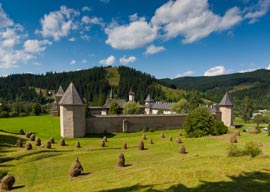
August 28, 2015

Sucevita Monastery
Source: Shutterstock
 There are, Emil says, a number of hermits living in the delta, saying mass alone. Two of them come to this monastery for food from time to time. The others subsist by themselves. Since I first set foot on Romanian soil in 1990 I have been enchanted by the place, but now I start to see that it is the otherworldly religiosity of the people, their mysticism, that makes this country so remarkable. All our life long we go from one spot of holy ground to another, according to John Updike. This is even more true in Romania than elsewhere.
There are, Emil says, a number of hermits living in the delta, saying mass alone. Two of them come to this monastery for food from time to time. The others subsist by themselves. Since I first set foot on Romanian soil in 1990 I have been enchanted by the place, but now I start to see that it is the otherworldly religiosity of the people, their mysticism, that makes this country so remarkable. All our life long we go from one spot of holy ground to another, according to John Updike. This is even more true in Romania than elsewhere.
When I go next time I”ll not go to the Sulina channel; I prefer the part of the Old Danube and Milea 23. It’s more than a decade since I first stayed there and it has become more touristified. We heard the little towns of Sulina and Sf. Gheorghe are in the same state. PSD politicians have bought the land and development is going on, though slowly.
Our third and last day was a beautiful trip via Mila 23 to Tulcea and then a drive through small roads to the great seaside resort of Mamaia. The heat was intense. It was Sunday. We stopped at the famous mosque at Babadag, the oldest in Romania. Absolute silence in the insufferably hot little place. The mosque is closed. So was the Museum of Oriental (meaning Muslim) Art and Artefacts. No one was in sight except for two boys, who pleaded with us for a leu (15p). One said there were no problems between Muslims and Christians in the town. The Muslims were gypsies, by the way. This is not the story I”d read about that week in the press, which said the Muslim gypsies are ostracized by the other ethnic groups, meaning the Romanians, Tatars, Lipoveni, Hungarians, Greeks, and even the rest of the gypsies.
On we drove and came at last to the ruined Roman city of Histria. Histria is, as Dr. Johnson said of the Giant’s Causeway, worth seeing but not worth going to see. But we were only ten miles away. Some pillars, some statues, a lot of Communist renovation. The sea is not in sight to give a lonely melancholy to the place, but a melancholy and sense of desertion exist. Two charming students, the girl a shy beauty who does not know she is good-looking, gave us a questionnaire to fill in about how we would react if we saw a frog, a snake, or a fox among the ruins. I felt loving and pure saying I would interact in a friendly way with each. Some benighted people ticked the box that said they would kill the snakes. Twenty-six-year-old British students, even making allowance for the fact that they are science side, not arts side, would not be nearly so innocent as these two.
I shall go back, but next time to stay in simple places and find somewhere in the little dead town of Sulina. Sulina is a place that was briefly important after an international Danube Commission was housed there at the end of the (first) Crimean War and until the harbor silted up. One of my friends once spent a week there. When she came back I asked her if Sulina had a beach and she replied, apologetically,
Yes, it has, but it’s completely uncommercialized.
I must hurry in the hope that this is still the case.